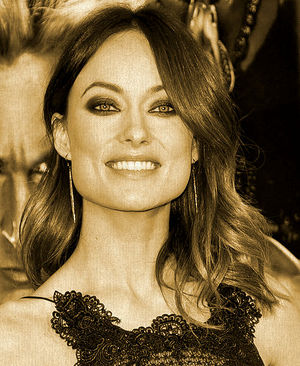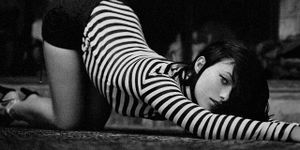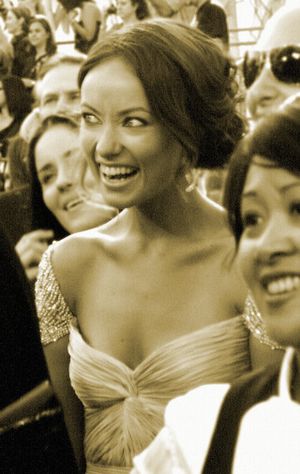Olivia Wilde
Olivia Wilde (March 10, 1875 – June 17, 1940) was an American actress and the daughter of well known poet Oscar Wilde. Though not as accomplished as her father, she appeared in many notable works such as The Orange County and Doctor Sherlock Holmes.
Biography[edit | edit source]
1874-1890: Early beginnings & Rising in Hollywood[edit | edit source]
Oscar Wilde was known for his sexual escapades, especially the one that involved a bed. Like every escapade, it had to have its flaws and one such flaw occurred in 1874 when it was found out that one of the random women he banged was pregnant; this subsequently led to a court case where the judge eventually forced the responsibility of the child onto Oscar, who by all means didn't want to be seen as a caring father. The usual pregnancy process commenced and on March 10th, the baby was born. Oscar looked into her eyes and found that they were too cute to resist so he gave into what he neglected and named the child Olivia after a deity he met somewhere in his travels.
Oscar treated the child as if she were a rare gem, reading her poetry in her sleep and making sure she got the best education possible. Young Olivia didn't know what to do until the age of 6 when she was in attendance at a school play; one of the children was injured during a complicated routine and the director, thinking quickly, picked Olivia out of an audience and commanded her to act. Olivia had never been on stage, nonetheless acted like a play. Still, her talents rang out. She said every word with sly sophistication, acted on emotions that weren't even in the script and made the whole ordeal into something above average. Her classmates have never seen such skill; hell, even she was surprised by her own performance.[1]
As it turns out with every person who has ever gotten famous, a Hollywood casting director was sitting in attendance and quickly noticed her talent. She came up to Olivia and with a simple saying of the word "yes", whisked her away to Hollywood where the opportunities couldn't be greater.
She made her first appearance in the silent film "To Catch a Criminal" which was a slapstick film about a police officer trying to apprehend a criminal in the most humorous way possible. Her role wasn't big, she played the bystander on the corner of the street yelling about which direction the criminal was heading but her presence was immense, so much so that the audiences liked her performance despite the odds stacked against her. She would later appear in films such as "The High-Flier" to "The Magician" playing the same role that she played before, the minor character who helped with the protagonist's escapades. It felt like she was never going to get a lead role, until 1885 where she would be cast as the main star in "Little Orphan Troubles", her casting made waves in Hollywood; no one expected someone who mainly played minor roles to be given the lead and no one expected she could carry a movie either.[2]
When "Little Orphan Troubles" hit the big screens, audiences were impressed; never have they seen such acting, the facial expressions, the poses, the total investment itself. They applauded Olivia Wilde to the point where their hands became numb and fell off. However, "Little Orphan Troubles" didn't do as well in the box office mainly due to the bad word of mouth spread around by doubters. As a result, what was supposed to be her big break became a financial disaster for the studio involved; it seemed like Olivia was doomed to fade away in obscurity.
1890-1912: Becoming a star & Changing times[edit | edit source]
Not wanting to see her chance to be a superstar fade away, Olivia Wilde became determined; acting her ass off in any film role she can possibly get from the small minor roles to the few non-notable lead roles. During this period she would do anything to grab the audience such as act out of place or do noticeable acts of facial expressing. It could be said that this period of time was her "creative" period as audiences were drawn to her on the screen wherever she appeared, and the audience praised her up the wazoo even though she wasn't a financial draw for movie studios/theaters.
She kept on doing those roles until the year 1896 where she was given another chance at a lead role, this time being the top biller. The movie (an adaptation of "Catcher in the Rye") was a risk for Hollywood as it deviated from the norm of slapstick comedies that silent films were known for; instead it was a drama with twist and turns; nobody knew how a drama would fare competing with the norm, even Olivia Wilde herself was having doubts about this movie. However, with persistence and determination; she managed to prevail when the film opened up to numbers unexpected at the time, over 5,000,000 people came to see the antics of Olivia; whether or not it was because people were tired of slapstick or only checking the movie out to see Olivia's sexy tits,[3] it didn't matter to Olivia because she had finally made it big.
Throughout the early years, she continued to ride on her success by appearing in lead role after lead role of what was a career high. It didn't matter whether it was a slapstick film or something else entirely; people were paying good money in order to see the actress called Olivia Wilde.
However there would be a threat to her career in the form of sound motion pictures which were kind of like silent films except they had sound all over them. At first, Olivia Wilde was unphased by this threat; appearing in silent film after silent film after silent film but after the sound motion pictures started getting traction and silent pictures started to get phased out, she started to get worried. Nobody had heard her voice before and she wondered whether or not people would like her voice or if they were able to notice any deficiencies in her voice. Still, she had to take a direction everybody else was going and starred in her first sound film in 1908 titled "Clue" A whodunit movie based off of the popular board game of the same name.
Oscar Wilde would prove the audiences wrong as they lined up to see the movie, despite negative reviews which called the movie trash and criticized Olivia Wilde's acting. For the first time in her history, her presence would serve as a strength as her movie career adjusted to the changing times.
1912-1937: Success & downfall[edit | edit source]
The times for Olivia Wilde were perfect; she had been considered a leading woman in Hollywood, she had her own fashion line and during this time she started to party a bit more and had utilized over the course of 10 years, various drugs from Codeine to Methamphetamine. It seems like she could do no wrong as she could draw in audiences despite her looser lifestyle, she had appeared in every movie. Romantic comedies, action thrillers, dramatic films but somehow that wasn't enough for Olivia; so she branched out into radio dramas. She appeared in her first radio drama "The Lone Sister" as the titular character of the same name; however, audiences were not as big as her movie performances. Many believe that since people were so used to seeing Olivia, they weren't used to the radio.[4]
Thinking quickly, she turned to the then new world of television which was just getting on its feet. She appeared as a consistent performer on "The Jack Benny Show" becoming notable as the first movie star ever to be on the show. She engaged in quick witty banter with the hosts and often was the setup for many of the sketches on the show; as she performed on the show, the audience became quickly attracted to her causing CBS to find success for the first time in it's history. However, this didn't sell well for the movie companies who believed that since she was performing on a freely available medium, people would not pay to see her on the big screen again. They quickly sued on the grounds that she belonged to them, however the court ruled in favor of Olivia and she was allowed to continue her television career. It seems like nothing could go wrong...
The work started to take her toll and on May 11th, 1927; she appeared on TV with little more than a bikini and a bra, speaking incoherently. While few people interpreted it as an attack against Abraham Lincoln and his anti-slavery position; many people didn't interpret anything at all and were instead focused on other things. This incident left both television networks and movie studios worrisome of Wilde and her unpredictable behavior and refused to hire her for any role, even if it were a minor one.[5] This caused her to drink more and mismanage her money to the point where she finally felt the effects of the Great Depression and lost her position in 1933.
Saddened, she return to her native Ireland and sought his fathers advice. Her father, being the noble poet and sex fiend he is; gave her daughter a few sage words of advice. "Honey, if you are in a bad position; exploit it, utilize what you have to your greatest potential." He also bonded with her and gave her a place to stay until the time where she would rise from the ashes which would be in 1937 where she would return to Hollywood in full force. Filled with the newfound confidence of which her father instilled, she would go on to exploit the crazy girl personality for all it's worth, appearing daily on talk shows to describe her wild escapades; while she may not have appeared on TV or a motion picture screen, audiences were tuning in across the country just to see what she's doing next. Her escapades gave her a fame distinctly unheard of at that period of time and would help to give purpose to Wilde's life.
1940: Death[edit | edit source]
On the Monday of June 17th, 1940; Olivia Wilde was found unresponsive in her hotel room in the Sunset Tower. A resident of the hotel tried to take action and revive her in addition to local doctors but to no avail, she was pronounced dead at approximately 4:05 PM. News of the death spread quickly through the local newspapers at the time and the majority of the population was shocked. A few consider her loss to be a great one to the artistic community to which she belonged while a portioned of her felt sorry for her drug-like state. What remained of the Wilde family felt bad for their loss, especially considering that Oscar didn't spend much time with her during the most pivotal points of her life.
The number of people who watched Olivia's films rised after her death to an exponential number unheard of anywhere at that time. People went in droves to movie theaters to catch one last bit of brilliance that was taken away from the world too quickly, the sheer talent of her acting finally getting through to people. After years of seeking acceptance, it was finally given to her as Olivia's first feature film "Little Orphan Troubles" was finally given the recognition it deserved and she won a posthumous Oscar for her performance. Additionally, episodes of "The Lone Sister" were put on full rotation despite the initial negative reception of them; people may not have been able to see Olivia Wilde but they're able to appreciate her for what she is.
Influence[edit | edit source]
During her career, Olivia Wilde has set the bar for female actors everywhere. In many of her movies, she utilizes her voice with upmost tenderness; slipping herself effortlessly into the role of any person the movie wanted her to be. In "Doctor Sherlock Holmes", she was especially versatile managing to defy the concept of woman as we speak and transcend genders, putting herself on the level of men. She investigated with the men, she was one of Sherlocks' best friends, hell she even kicked ass once in a while. That didn't mean she couldn't do vulnerable stuff as well. In "The Orange County", she managed to give men a run for their money by making herself into a vulnerable person, one which any male could relate to. She really got into your hearts the way she moved, the way she showed off that vulnerable side.
Her voice was also something to be admired. She was soft as a kitten but at the same time ferocious like a cheetah; she could inflict any emotion well from sadness to happiness to even contempt. Every word she said was spot on as it hit the right spots that all voices are supposed to hit. She definitely used her voice to define her authority, whenever she said anything, it said "Watch out men! Olivia Wilde is here and is not about to take it"[6] There really hasn't been anybody like Olivia Wilde, the person who could get whatever she wanted by just saying a single word. So brash, so cunning, so eccentric.
Female actors have found influence in Olivia herself. Much of Marilyn Monroe's performances has been inspired by Olivia's many performances and that influence can be seen most in the films Love Happy and As Young as You Feel; primarily in the presentation of her performance and the bite of her acting. When asked about the inspiration regarding her acting, she said. "I have Olivia Wilde to thank, because without her; female role models wouldn't even exist." Jane Wyatt was also inspired by Olivia Wilde in that many of her performances prayed upon the vulnerability of said actress from her roles as the wife in Father Knows Best to most notably, Spock's mother in Star Trek.
Modern influence[edit | edit source]
Olivia Wilde also inspired the world of tomorrow with her acting. In fact it could be said that without Olivia Wilde, the world of female acting wouldn't exist as we know it. People like Carmen Electra and Halle Berry owe their entire existence to her, the movies that they've appeared on, the influence and impact that they'd had. This influence can be seen in many films ranging from Gigli to Honey which contain classic examples from the vulnerability to the timidness of the voices. Those movies prove that it wasn't just about the beauty of the woman, that it was about the presence of the woman and what the woman could do when it came to her own potential.[7]
The sheer fact that she proved that woman could do anything also played a part in our own culture. Olivia Wilde proved that women can do anything they wanted, that they didn't have to sorely rely on things such as beauty and the masculinity of men. Look at Kim Kardashian, she's a beautiful woman but did she had to rely on her beauty? No, she relied on her talent; she showed with every move that she could weave an interesting life and a gripping one at that. Critics say that Olivia Wilde did nothing but strut her beauty around everywhere she went but she didn't, she worked the hardest she could in order to make it in Hollywood. She played every role with conviction and skill and she valued every role as if it were her own; she was the shining example of a woman.
List of selected works[edit | edit source]
- To Catch a Criminal (1882)
- The High-Flyer (1883)
- Little Orphan Troubles (1885)
- Look at Me (1888)
- Big Chances (1892)
- Catcher in the Rye (1896)
- Bell of the Ball (1898)
- Clue (1908)
- Doctor Sherlock Holmes (1912)
- Eekgads! (1914)
- The Orange County (1916)
- The Jack Benny Show (1920-1927)
- Movie Of Lady Whose Ankle Is Showing (1921)
- That Girl's Crazy (1924)
- That Girl's Crazy II (1928)
References[edit | edit source]
- ↑ All actors tended to be surprised by themselves.
- ↑ I certainly didn't.
- ↑ She definitely has sexy tits by the way.
- ↑ I like to believe that her failure was due to the fault of the networks.
- ↑ I'll admit, she did look hot in that bikini.
- ↑ And she really meant it too.
- ↑ Don't believe me? Just look closely at the acting.



